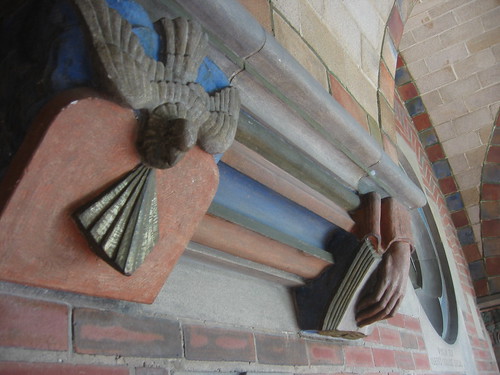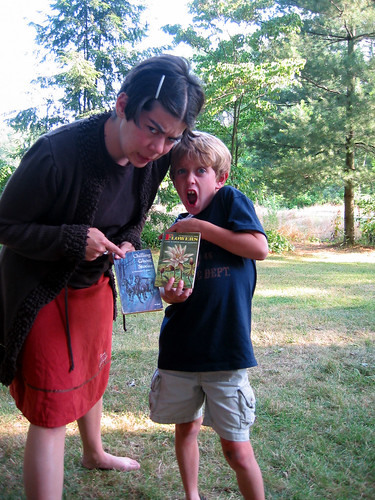
{Henri Rousseau, Tiger in a Tropical Storm (Surprised!), 1891}
On a night in the mid-1960s, as a young Alberto Manguel read aloud to Jorge Luis Borges from Kipling's stories, Borges lamented,
What a pity not to have been born a tiger.I think we can be pardoned for being glad that he didn't get his wish.

{Borges in the Hotel Beaux, Paris, 1969}
As a sixteen-year-old in 1964, Manguel became another in a long line of readers who supplied Borges with his necessary daily allowance of those words he could no longer see, and he's gathered his memories of those evenings into a slim book, With Borges (2006). Simultaneously a book of anecdotes and a meditation on Borges and his work, it's a charming, pleasant little book--the sort of book I wish were available for every writer I love. (Just how unobtrusive was Anthony Powell as he watched his contemporaries at parties? What did Haruki Murakami talk about with his patrons and his fellow clerks when he worked in a record store? How irritating--or frustrating--was Casanova for his male friends?)
The Borges that Manguel presents is not unfamiliar or surprising. We encounter yet again his odd reading tastes--in some sense arrested in a precocious adolescence--the Kipling, Chesterton, Homer, Dante, Stevenson, Cervantes that he read over and over again. We are reminded of his unusual reading prejudices:
One could construct a perfectly acceptable history of literature consisting only of the authors Borges rejected: Goethe, Rabelais, Flaubert (except the first chapter of Bouvard et Pechuchet), Calderon, Stendhal, Zweig, Maupassant, Boccaccio, Proust, Zola, Balzac, Galdos, Lovecraft, Edith Wharton, Neruda, Alejo Carpentier, Thomas Mann, Garcia Marquez, Amado, Tolstoi, Lope de Vega, Lorca, Pirandello.Even after Tolstoy, there are half a dozen or so of my favorites there (and then there's the one that's most surprising to me, Maupassant, whose style and subjects I would have expected to resonate with Borges). But it was a matter, he explained in an interview, of simply reading what he liked:
I am a pleasure-seeking reader: I've never allowed my sense of duty to have a hand in such a personal matter as that of buying books.I think Borges is being somewhat disingenuous there: his reading carried with it a whiff of the obsessional as well, and obsessions, though they may begin in pleasure, rarely end there. Yet it's hard to criticize Borges's choices: as readers we are all riddled with holes, gaps intentional or unintentional, and almost no one has drawn on his reading as fruitfully as Borges, reading and rereading and interpreting and distilling books until they became something totally new.
What Manguel gives us instead of a new view of Borges is a more intimate view--still focused on books, because books were Borges, it seems--a fascinating glimpse of his conversation and passing comments. We learn that he was never satisfied with his story "Shakespeare's Memory," one of my favorites, and that he felt he had never quite honored its inspiration, which was an overheard line in a dream: "I will sell you the memory of Shakespeare." After revealing that Borges asserted the questionable proposition that a writer should not be so impolite as to surprise the reader, Manguel points out, rightly, that Borges, instead, sought conclusions
that were astonishing but obvious. Recalling that Ulysses, tired of prodigies, wept for love at the sight of his green Ithaca, he concluded: "Art should be like that Ithaca--of green eternity, not of prodigies."Following a discussion of the lost Library of Alexandria--a loss which one would expect a librarian and bibliophile to include among eternity's great laments--Borges explained that
The number of themes, of words, of texts, is limited. Therefore nothing is ever lost. If a book is lost, then someone will write it again, eventually. That should be enough immortality for anyone.Presumably the Library at Alexandria didn't serve double duty the way that we learn Borges's personal library did: when he found himself with currency, he would tuck it into various books; when he needed money, he would pluck books from the shelves until he found some. {Side note: the book collection as bank, an organizational schema I failed to consider.} Perhaps that was simply another aspect of the playful side of Borges, which appears again and again, as when Manguel reports that Borges
once recited the "Our Father" in Old English, in a crumbling Saxon chapel near Dr. Johnson's Lichfield, "to give God a little surprise."I suppose it's okay to surprise God--after all, such opportunities are surely rare, and thus such a surprise wouldn't be the cheap shot that surprising one's readers would be.
But the best of playful Borges, and probably my favorite moment in the book, the one I'll recall the other anecdotes and opinions have been forgotten, is an admonition by Borges to his five- or six-year-old nephew:
If you behave, I'll give you permission to think of a bear.It's Borges at his cleverest and lightest--and yet that line also hints at the essence of his art. Thought is all, subjectivity is can nearly create its own realities--and even the simplest statement can be momentarily dislocating. It reminds me of his "Argumentum Ornithologicaum," collected in Dreamtigers (1964):
I close my eyes and see a flock of birds. The vision lasts a second or perhaps less; I don't know how many birds I saw. Were they a definite or an indefinite number? This problem involves the question of the existence of God. If God exists, the number is definite, because how many birds I saw is known to God. If God does not exist, the number is indefinite, because nobody was able to take count. In this case, I saw fewer than ten birds (let's say) and more than one; but I did not see nine, eight, seven, six, five, four, three, or two birds. I saw a number between ten and one, but not nine, eight, seven, six, five, etc. That number, as a whole number, is inconceivable; ergo, God exists.

{Photo by rocketlass}
Sometimes, just as an elephant cannot not be thought of, one may actually need permission to think of a bear.
I'll close with Manguel's account of what could be taken as Borges's ethos:
He believed, against all odds, that our moral duty was to be happy, and he believed that happiness could be found in books, even though he was unable to explain why this was so. "I don't know exactly why I believe that a book brings us the possibility of happiness," he said, "but I am truly grateful for that modest miracle."
Its intentionally limited compass could certainly be argued with--in my morally healthiest moments, I'd replace happiness there with justice--but at the end of a night of passing happily from one book to another book to another book as thunderstorms rumble in the background, I'll gladly adopt it, however temporarily, as my own.












